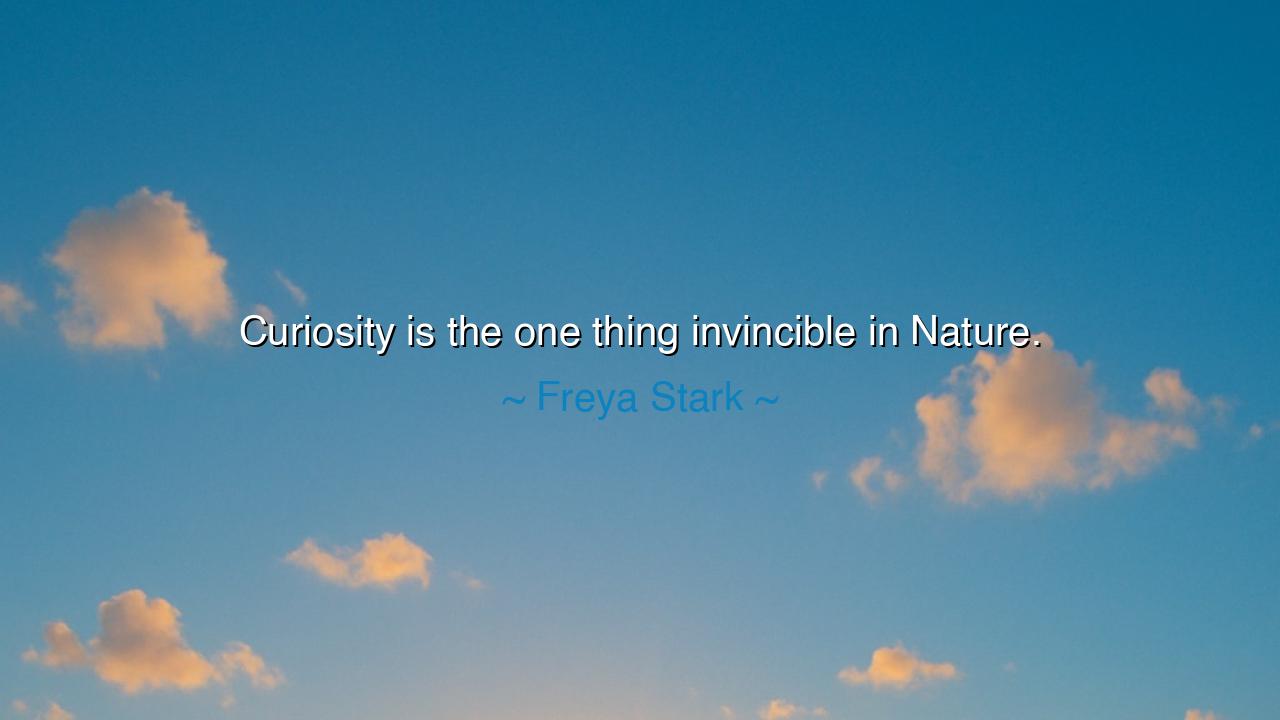
Curiosity is the one thing invincible in Nature.






Freya Stark, the fearless traveler who wandered deserts and mountains where few women of her time dared tread, once proclaimed: “Curiosity is the one thing invincible in Nature.” These words, born of her journeys across Arabia and Persia, strike with the power of revelation. For they remind us that kingdoms fall, mountains erode, civilizations rise and fade, but curiosity — that restless hunger to know, to see, to seek — cannot be silenced. It is the spark in the human soul that refuses defeat, the flame that endures storms and ages alike.
The origin of this thought comes from Stark’s own life. She lived in an era when women were expected to stay behind closed doors, yet her curiosity led her into lands unknown, armed with little more than courage, notebooks, and determination. To her, Nature herself embodied this same quality. A vine will twist toward the light, a river will carve through stone, a seed will push through hardened earth. So too does the human spirit, guided by curiosity, break boundaries, open doors, and find paths where none were thought to exist.
History abounds with proof of this truth. Consider Galileo, who dared to lift his gaze to the heavens with a telescope. Against dogma, against the threat of censure, his curiosity pressed forward, revealing moons around Jupiter and truths that would shake the world. Or think of Marie Curie, who through relentless curiosity uncovered the mysteries of radioactivity, though her work cost her health and even her life. Empires might resist, traditions might chain, yet the invincible force of curiosity overcame. It is the undefeated warrior of progress.
But Stark’s words are not limited to the grand halls of science or the daring journeys of explorers. They speak also to the quiet moments of life. The child who asks “why?” for the thousandth time is embodying this invincible force. The farmer who experiments with his soil, the artist who tests a new color, the healer who wonders at the root of a plant — all are guided by the same eternal thread. Curiosity is not arrogance, but humility; it admits that we do not yet know, but longs to find out.
There is also courage hidden in curiosity. To ask is to risk, to seek is to wander into the unknown. Many fear this, preferring certainty over discovery, comfort over growth. But curiosity, when embraced, leads to expansion of the mind and spirit. It tears down walls of ignorance and replaces them with bridges of understanding. Stark saw this not as a frailty, but as the strongest quality of Nature herself — for even when life is battered, even when nations crumble, the desire to seek what lies beyond endures.
The lesson for us, then, is clear: never let your curiosity wither. Do not allow age, fear, or pride to quench it. Nourish it, for it is the most invincible part of your being. Ask questions that others dare not ask, travel paths that others dismiss, and open your eyes to the mysteries that surround you daily. Let the rivers, the stars, the people you meet, all become teachers to your curiosity. In this way, your spirit will remain alive, resilient, and untamed.
What must you do? First, cultivate the habit of asking “why” — not as rebellion, but as reverence for truth. Second, allow yourself to wander, in mind or in body, beyond the borders drawn by fear. Third, remember that curiosity is not selfish, but a gift to the world: for every question answered, every mystery revealed, enriches not only you but all humanity.
Thus let Freya Stark’s words endure as both a challenge and a comfort: “Curiosity is the one thing invincible in Nature.” Guard it, honor it, and live by it. For as long as curiosity remains unbroken in you, no defeat, no hardship, no silence can truly conquer your spirit.






AAdministratorAdministrator
Welcome, honored guests. Please leave a comment, we will respond soon